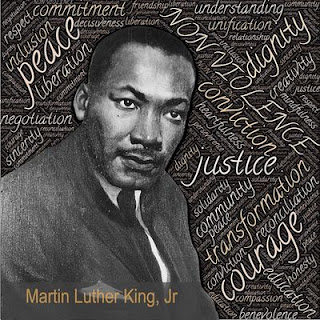Lots of people are fed up with police brutality in general and with the disproportionately higher rates of police brutality aimed at Black men and other persons of color in particular. This strikes me as a perfectly sensible reaction. We should all be able to expect police officers to behave professionally, and we should be able to interact with them without fearing for our lives. After all, police officers are supposed to be there to "protect and serve" us. They are supposed to be public servants and not public executioners. That many of us have learned that we cannot necessarily expect professional behavior should lead to feelings of frustration. That many of us have learned that we are right to be fearful of the police is unacceptable and requires sustained effort on all of our parts to change.
Having said that, I do think it is important in light of recent events to emphasize that violence is not the answer. No amount of understandable frustration or outrage can excuse what happened in Dallas and elsewhere around the U.S. I think almost all of us can agree that police officers across the U.S. appear to be killing far too many civilians without just cause. We should be upset about that. But murdering police officers is not the answer. Such actions seriously undermine the stated goals of those engaging in peaceful protests and any of us who hope to see an end to police brutality. In fact, I'd venture a guess that the single worst thing we could do if we want to end police brutality is to make more police officers more fearful than they already are.
With an armed Black man featured on every television news station shooting police officers, I expect we will likely see record gun sales among Whites. It appears I am not alone in this prediction. And with incident after incident involving White police officers murdering Black men, it seems likely that we will see increasing numbers of Black men arming themselves. Why wouldn't they? The question then becomes whether we are still capable of turning back from the brink and doing something meaningful to repair the breach between police officers and the communities they serve or whether will this represent yet another step toward our bunker mentality.
Somewhere along the way, even before our police forces became so heavily militarized, we seem to have made a series of mistakes in how we train our civilian police forces. The all-too common approach of police officers arriving on the scene, barking orders, and then assaulting anyone who does not immediately comply can be quite effective in some scenarios and disastrous in others. Many of us recognized this, which is why some police departments now at least attempt to teach officers more productive ways of interacting with seriously mentally ill persons they encounter. But even where implemented, this training rarely goes far enough and is still resisted by some. I cannot help thinking that a more basic sort of cultural change is needed in terms of how officers view their role and their relationship to civilians in general.
While I do believe that the problems we face are solvable, I have to admit that all the #prayfordallas nonsense leads me to be skeptical about the number of people who are interested in trying to find real solutions to these problems. If appeals to the "divine" accomplished anything tangible, I suspect we would have solved problems like this long ago. We need real-world solutions that hopefully do not involve any more killing.
